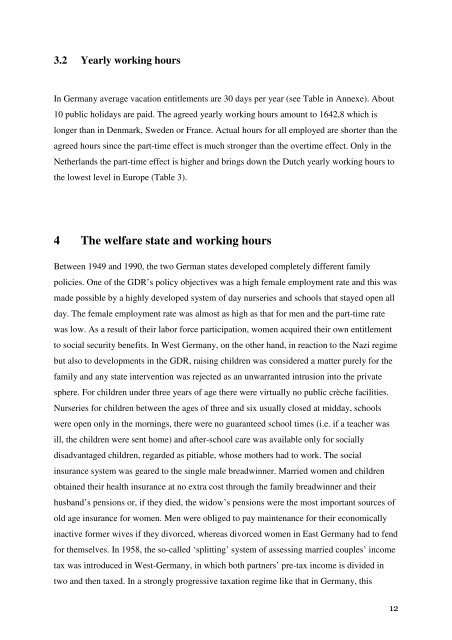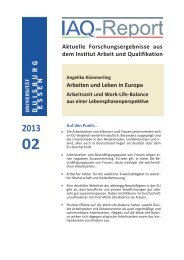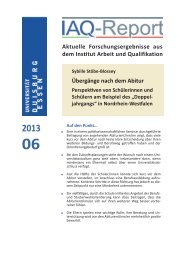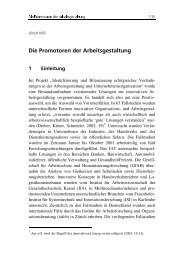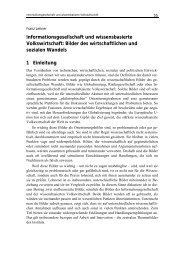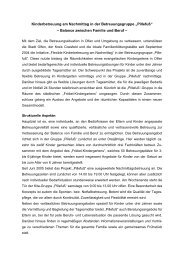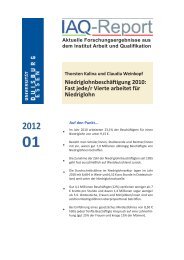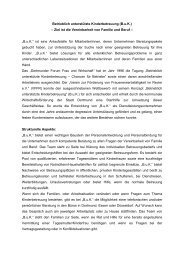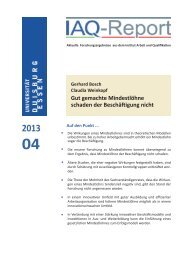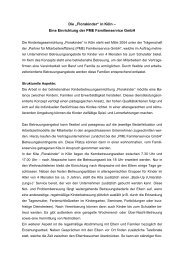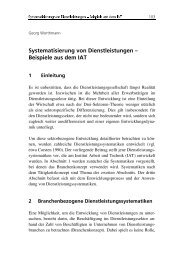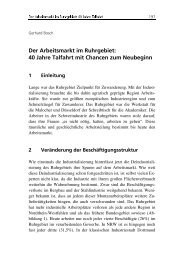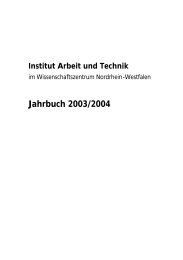Gerhard Bosch Working time and working time policy in Germany 1 ...
Gerhard Bosch Working time and working time policy in Germany 1 ...
Gerhard Bosch Working time and working time policy in Germany 1 ...
Create successful ePaper yourself
Turn your PDF publications into a flip-book with our unique Google optimized e-Paper software.
3.2 Yearly <strong>work<strong>in</strong>g</strong> hours<br />
In <strong>Germany</strong> average vacation entitlements are 30 days per year (see Table <strong>in</strong> Annexe). About<br />
10 public holidays are paid. The agreed yearly <strong>work<strong>in</strong>g</strong> hours amount to 1642,8 which is<br />
longer than <strong>in</strong> Denmark, Sweden or France. Actual hours for all employed are shorter than the<br />
agreed hours s<strong>in</strong>ce the part-<strong>time</strong> effect is much stronger than the over<strong>time</strong> effect. Only <strong>in</strong> the<br />
Netherl<strong>and</strong>s the part-<strong>time</strong> effect is higher <strong>and</strong> br<strong>in</strong>gs down the Dutch yearly <strong>work<strong>in</strong>g</strong> hours to<br />
the lowest level <strong>in</strong> Europe (Table 3).<br />
4 The welfare state <strong>and</strong> <strong>work<strong>in</strong>g</strong> hours<br />
Between 1949 <strong>and</strong> 1990, the two German states developed completely different family<br />
policies. One of the GDR’s <strong>policy</strong> objectives was a high female employment rate <strong>and</strong> this was<br />
made possible by a highly developed system of day nurseries <strong>and</strong> schools that stayed open all<br />
day. The female employment rate was almost as high as that for men <strong>and</strong> the part-<strong>time</strong> rate<br />
was low. As a result of their labor force participation, women acquired their own entitlement<br />
to social security benefits. In West <strong>Germany</strong>, on the other h<strong>and</strong>, <strong>in</strong> reaction to the Nazi regime<br />
but also to developments <strong>in</strong> the GDR, rais<strong>in</strong>g children was considered a matter purely for the<br />
family <strong>and</strong> any state <strong>in</strong>tervention was rejected as an unwarranted <strong>in</strong>trusion <strong>in</strong>to the private<br />
sphere. For children under three years of age there were virtually no public crèche facilities.<br />
Nurseries for children between the ages of three <strong>and</strong> six usually closed at midday, schools<br />
were open only <strong>in</strong> the morn<strong>in</strong>gs, there were no guaranteed school <strong>time</strong>s (i.e. if a teacher was<br />
ill, the children were sent home) <strong>and</strong> after-school care was available only for socially<br />
disadvantaged children, regarded as pitiable, whose mothers had to work. The social<br />
<strong>in</strong>surance system was geared to the s<strong>in</strong>gle male breadw<strong>in</strong>ner. Married women <strong>and</strong> children<br />
obta<strong>in</strong>ed their health <strong>in</strong>surance at no extra cost through the family breadw<strong>in</strong>ner <strong>and</strong> their<br />
husb<strong>and</strong>’s pensions or, if they died, the widow’s pensions were the most important sources of<br />
old age <strong>in</strong>surance for women. Men were obliged to pay ma<strong>in</strong>tenance for their economically<br />
<strong>in</strong>active former wives if they divorced, whereas divorced women <strong>in</strong> East <strong>Germany</strong> had to fend<br />
for themselves. In 1958, the so-called ‘splitt<strong>in</strong>g’ system of assess<strong>in</strong>g married couples’ <strong>in</strong>come<br />
tax was <strong>in</strong>troduced <strong>in</strong> West-<strong>Germany</strong>, <strong>in</strong> which both partners’ pre-tax <strong>in</strong>come is divided <strong>in</strong><br />
two <strong>and</strong> then taxed. In a strongly progressive taxation regime like that <strong>in</strong> <strong>Germany</strong>, this<br />
12


